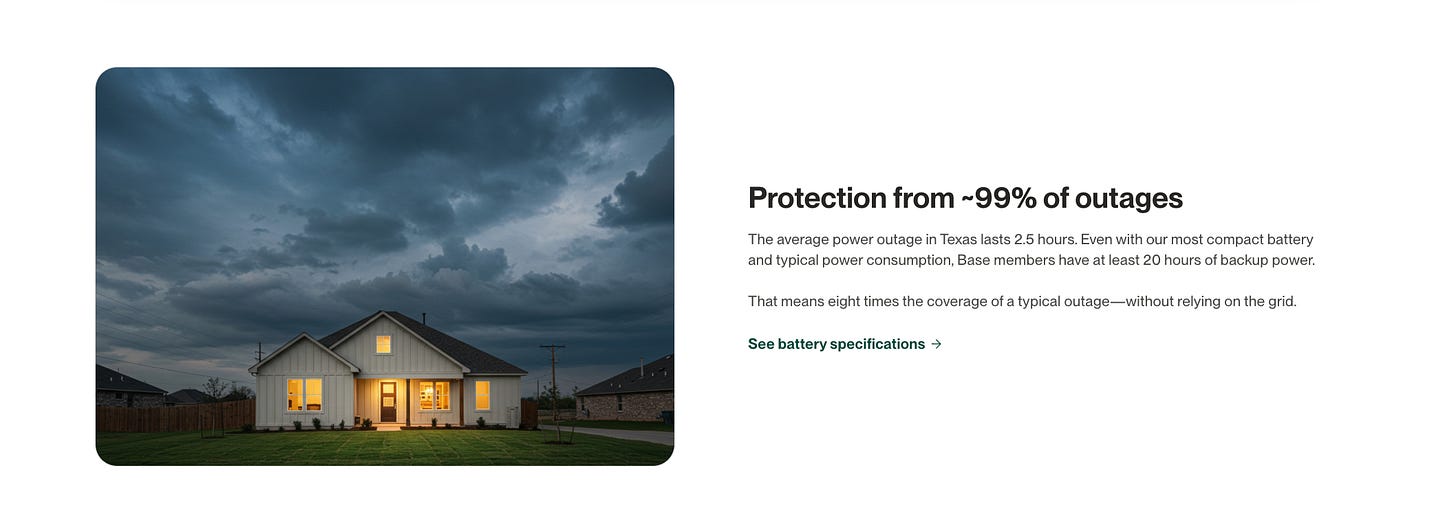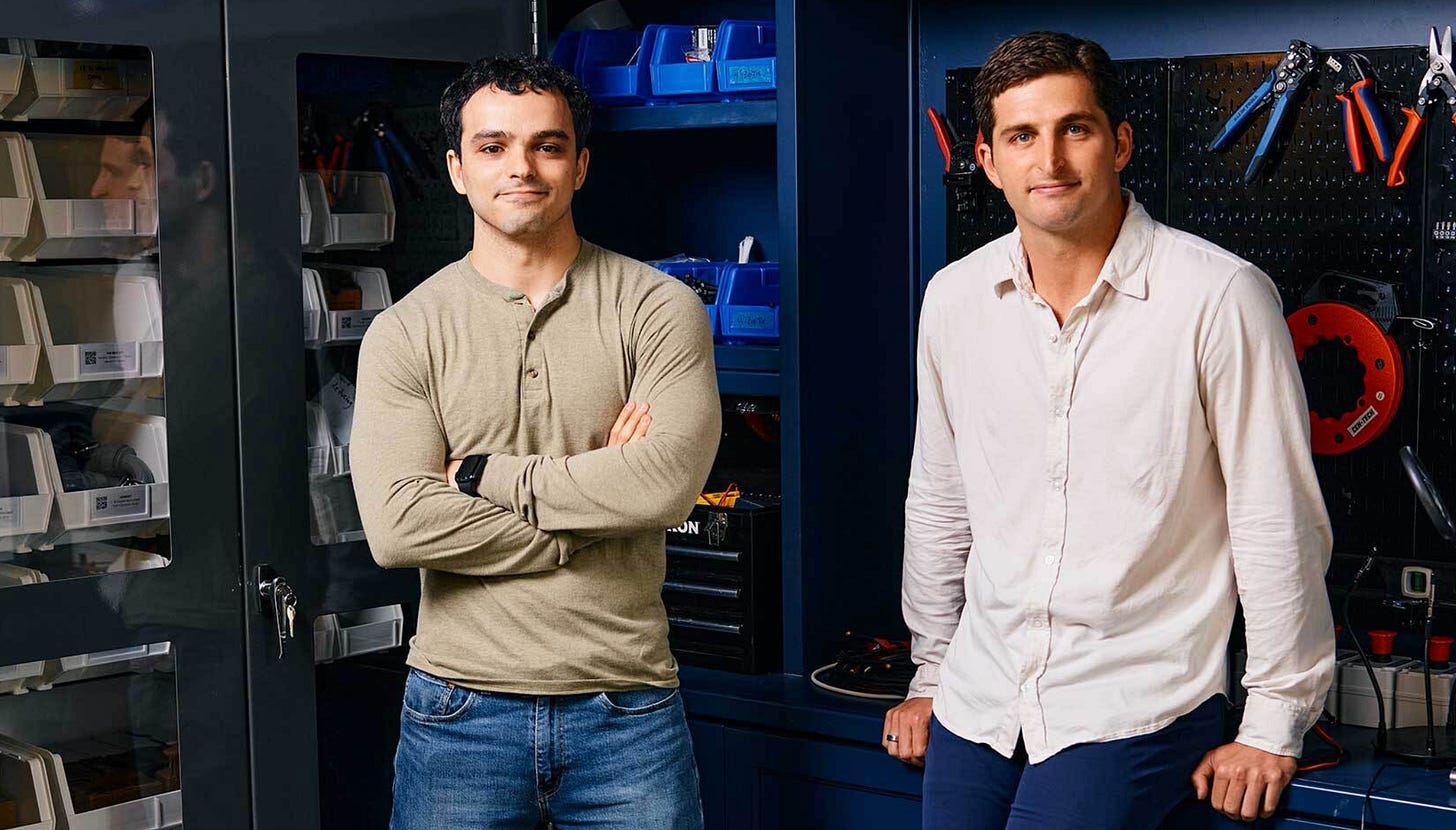BREAKING: Base Power's $200M Series B
Co-Led by Lee Fixel of Addition, A16Z, Lightspeed, & Valor Equity Partners
The Next Multi-Generational Power Company
Fresh off the press with a $200M Series B funding announcement, we’re SO excited to share our conversation with Zach Dell and Justin Lopas, co-founders of Base Power. This brings their total funding to over $268M. Zach & Justin share their ambitious vision for revolutionizing the energy industry, how they’re vertically integrating Base, and how they’re aiming to become “the SpaceX of energy.”
Base’s $200M Series B was co-led by Addition, Andreessen Horowitz, Lightspeed and Valor Equity Partners with participation from existing investors Thrive Capital, Altimeter, Terrain, Trust and others. As part of the fundraise, Addition founder Lee Fixel will join Base Power’s board alongside Antonio Gracias of Valor Equity Partners.
→ Listen on X, Spotify, YouTube, Apple
The new capital aims to unlock the next phase of growth for Base, including team expansion, market entry, and new product development. The episode delves into Base's unique approach to vertically integrating battery technology, offering both grid services and affordable, reliable power to homeowners. The conversation highlights the founders' experiences at SpaceX, Anduril, Blackstone, and Thrive Capital, shedding light on their mission to fix the power grid through aggressive, technology-driven execution.
Learn how Base aims to become a household name starting with deployments in Texas and expanding nationwide in our FULL BREAKDOWN below. 🤠🔋⚡
About Base Power
Founded in 2023 and headquartered in Austin, Texas, Base Power is an energy company building a grid for the future—starting with battery-powered home energy service. The company’s mission is to advance human prosperity through energy abundance—delivering reliable and affordable power for all.
Timestamps
00:00 - $200M Series B Announcement
00:51 - Base's Vision & Execution Strategy
03:41 - The US Energy Problem & Grid Challenges
06:30- Why Texas? Strategic Location & Market
09:32 - Founders' Backgrounds & Entrepreneurial Journey
18:24 - Early Challenges & Iterative Approach
23:21 - Vertical Integration & Cost Advantage
26:05 - Customer Journey & Installation Process
30:34 - U.S. Energy Industry Breakdown
35:16 - Texas Energy Market & Regulatory Environment
38:38 - Scaling & Expansion Plans
42:45 - Team & Company Culture
46:58 - Future Vision & Goals
Base's $200 Million Series B: A New Era in Energy
Base Power, co-founded by Zach Dell and Justin Lopas, is on a mission to transform the power grid by building America’s next multi-generation energy company. In less than a year since its launch, Base Power has become one of the fastest-growing battery storage developers in the U.S., thanks to strategic partnerships with major players like Lennar, one of the nation’s largest homebuilders, and Bandera Electric Cooperative, marking the company’s first utility partnership.
Through its battery-powered home energy service, Base Power has already helped over a thousand of Texas homeowners save on electricity bills and protect themselves from outages. The company’s vertically integrated approach enables it to manage every step of the process, from designing and manufacturing batteries to installation, grid services, and retail electricity sales. This model allows Base to reduce costs, improve efficiency, and deliver affordable, reliable power to its customers.
“We're here to provide affordable, reliable power through technology. And the way that we do that is by building hardware, software, and deployment operations to deploy energy technology assets onto the grid, effectively and efficiently.
We adopted this strategy of compounding cost advantage through vertical integration. So we develop battery technology, we deploy the hardware, we own it, we operate it, we sell power directly to homeowners. We install the batteries ourselves, we do the field service and operations and kind of everything, all parts of the stack, to build out a fleet of distributed energy technology assets that we think, is gonna help, bring capacity to the power grid here in Texas. And ultimately, to the rest of the country.” - Zach
Co-Founders’ Backgrounds
Zach Dell, who serves as CEO, has a background in entrepreneurship and investing. He started multiple companies in high school and college before working at Blackstone, where he gained exposure to energy investing, particularly in lithium mining. Later, at Thrive Capital, Dell learned from fast-scaling companies like SpaceX, OpenAI, and Anduril, which inspired him to pursue his vision of distributed energy storage.
“Early in one's career, it's really important to learn what excellence is, and what it looks like, and consistently redefine what excellence is. And so I ended up at Blackstone because it was the place where I thought I would learn the most, work the hardest, and be around the smartest people in the world as far as underwriting sophisticated business models.” - Zach
COO Justin Lopas, on the other hand, has a mechanical engineering background and gained deep operational expertise at SpaceX, where he worked on the Falcon 9 and Starship rockets, and at Anduril, where he built the manufacturing team and worked on energy-related challenges.
“ Energy is basically the bedrock of essentially every other technological advancement that humanity's ever done. When I met Zach and he was thinking about batteries, it was like, wow, this is pretty interesting. There's a lot of technology operations and economics wrapped up into this problem space and just was very intellectually stimulating. And I think we found that we had very complimentary skill sets for solving this sort of problem.” - Justin
Justin Lopas (left), Zach Dell (right) Source: Ironspring
Why Now?
The timing for Base Power’s vision to build America’s next-generation energy company couldn’t be more critical. The U.S. energy landscape is undergoing a fundamental shift, driven by the rapid electrification of the economy. Historically, electricity demand—or "load growth," as it’s known in the industry—has increased marginally by one or two percent annually over the past few decades. This slow growth was offset by efficiency gains, such as the transition from incandescent to LED light bulbs. However, in the last two to three years, the trajectory has shifted dramatically, and electricity demand is now growing at an accelerating pace.
This inflection point is due to several key factors. First, the end-use of energy is shifting away from fossil fuels to electricity, driven by the adoption of electric vehicles (EVs) and heat pumps, which replace natural gas for heating. Additionally, the rise of data centers powered by artificial intelligence (AI) is further driving electricity consumption. These factors are compounding annually, creating a steeper curve of demand that the existing grid infrastructure was not designed to accommodate.
At the same time, renewable energy sources, such as wind and solar, are becoming the dominant forms of power generation due to their lower marginal costs compared to coal or natural gas. However, renewable energy is inherently variable—solar power is only available during the day, and wind power fluctuates based on weather conditions. This creates a mismatch between when energy is produced and when it is needed, leading to volatility and reliability challenges for the grid.
Base Power exists to solve this critical problem: the "missing middle" between growing electricity demand and the availability of renewable energy supply. As Lopas explained, “If you fast-forward a decade or two without companies like Base Power, you might have enough generation capacity—whether from nuclear, wind, solar, or natural gas—but there won’t be a way to connect that supply to the demand in a reliable way.” The grid, often described as the largest and most complex machine in the world, is simply not prepared for this rapid transformation.
Compounding these challenges are the limitations of traditional utility companies, which are often financially incentivized to spend money rather than save it due to outdated rate-based models, “ Basically, if you spend a dollar, you can earn a return on that dollar as a utility.” These companies also lack the technological and operational capabilities needed to rapidly deploy distributed energy storage at scale. This leaves a gap in the market for a new kind of energy company—one that blends innovation, technology, and operational efficiency to meet the moment.
Base sees this moment as analogous to the aerospace or defense industries a decade ago, which were disrupted by companies like SpaceX and Anduril. As Dell put it, “The energy industry doesn’t yet have a SpaceX or an Anduril—and we started Base to build that company for the energy space.” With electricity demand at a historic turning point and the grid under increasing strain, the need for a modern, technology-driven energy company like Base Power is greater than ever.
By leveraging its vertically integrated model and focusing on affordable, reliable power, Base Power is uniquely positioned to address this challenge. The company is rapidly deploying distributed battery storage in homes across Texas, helping to stabilize the grid while reducing electricity costs for its members.
The Business and Vision
Keep reading with a 7-day free trial
Subscribe to Sourcery to keep reading this post and get 7 days of free access to the full post archives.








